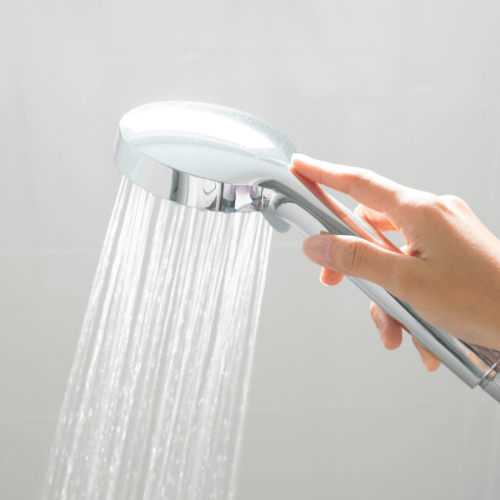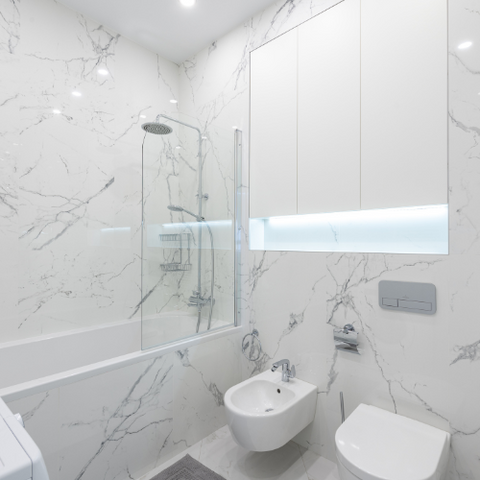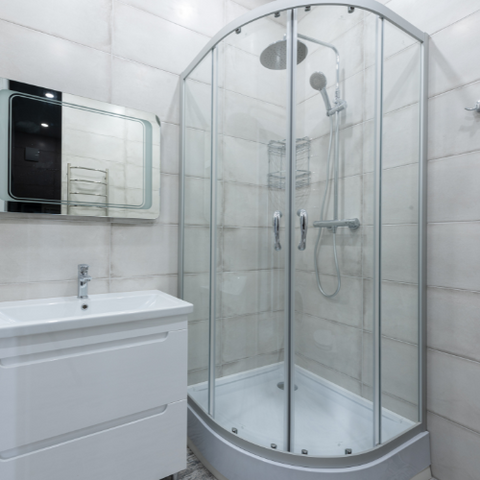 FREE UK DELIVERY.
EXPRESS OPTIONS AVAILABLE
FREE UK DELIVERY.
EXPRESS OPTIONS AVAILABLE

Replacing an Electric Shower: Top Things to Know
|
|
Time to read 4 min
 FREE UK DELIVERY.
EXPRESS OPTIONS AVAILABLE
FREE UK DELIVERY.
EXPRESS OPTIONS AVAILABLE
 UP TO 10 YEARS GUARANTEE
FOR PEACE OF MIND
UP TO 10 YEARS GUARANTEE
FOR PEACE OF MIND
 30 DAY RETURNS
NO QUIBBLE GUARANTEE
30 DAY RETURNS
NO QUIBBLE GUARANTEE

|
|
Time to read 4 min
Are you in the market for a new electric shower?
If so, you're in luck! In this post, we'll cover topics such as choosing the right model, how much to replace an electric shower and installing your new shower.
So whether you're a first-time homeowner or a seasoned pro, read on for all the information you need to make the best decision for your home.
An electric shower is a type of shower that heats water using electricity rather than a gas or water heater. Electric showers are popular because they heat the water quickly and are easy to install. They provide a steady stream of hot water, even if your home's water pressure is low.

When it comes to replacing an electric shower, budgeting is key. While there are many models available at various price points, you want to make sure that the shower set and accessories you choose fits within your budget.
Once you've considered how much you can afford to spend on a new shower and installation costs, then you can begin researching different models and features. When looking for a new shower, try to find one with energy efficient features such as adjustable temperature control, low-flow aerators, and advanced safety features like anti-scald technology.
In addition to the cost of purchasing and fitting a new electric shower, there may also be additional costs such as changing the size of your water pipes or replacing your existing power supply unit. It’s best to check with a qualified professional before beginning work, so that you can accurately plan for any additional costs.
When selecting a new electric shower, it is important to take into account your needs and preferences. Consider things like water pressure, temperature control, features such as shower body jets or steam showers, guarantee length, and price point.
After you've chosen your new electric shower model, it's time to install it! When installing an electric shower, there are several factors to consider. First of all, make sure that your home's electrical system can handle the increased load from the new appliance.
Additionally, most local codes require that a qualified electrician do any wiring or installation work on a bathroom appliance such as a shower, so that is something you will need to factor in. Lastly, be sure to follow manufacturer instructions for proper installation and use of your new electric shower. If you're not confident in your ability to install a shower yourself, it's best to hire an experienced professional.
Once you've got your new shower installed, it's time to take care of it properly. This includes regularly cleaning and descaling your shower as well as checking for any signs of wear or damage.
Another important step is making sure to periodically test the temperature control settings on your shower to ensure they're still working correctly and safely. You may want to consider getting regular maintenance checks done by professionals if you feel unsure about any part of the maintenance process.

If you're looking for an alternative to your electric shower, you may want to consider replacing it with a non-electric shower unit. Depending on the type you choose, non-electric showers often use less energy and require no electrical connection, so they can be installed quickly and easily. They also tend to be less expensive than electric models.
We’re put together a helpful shower buying guide to give you more tips!

Yes, electric showers are generally safe to use as long as they have been properly installed and maintained. It is important that all electrical work is carried out by a qualified professional, and you should ensure your shower has a fault current protection device (FCPD) fitted. This will reduce the risk of an electric shock in the event of a fault.
For further peace of mind, it is also recommended that you have an earth leakage circuit breaker (ELCB) installed in your home. This will trip the circuits if there is a fault in the wiring, preventing potential electric shocks.
Yes, electric showers can be affected by hard water and this may reduce their lifespan or cause them to function less efficiently over time. It is important to descale the shower regularly and take steps to reduce the amount of hard water entering the system, such as installing a water softener or filter to soften the water supply. This will help to prolong its life and keep it running smoothly for longer.
It is recommended that you descale your electric shower every six months or so to prevent any damage due to a buildup of limescale. You may need to do it more often if you live in an area with hard water.
Replacing a shower can be a daunting task, but with the right information and preparation, it doesn't have to be. By taking into account your budget, installation needs, and maintenance considerations, you'll be able to find the perfect model for your home.
Don't hesitate to contact us if you have any questions, our team of experts will be happy to help! We hope this post has been helpful in giving you an overview of what to expect when replacing an electric shower. Thanks for reading!